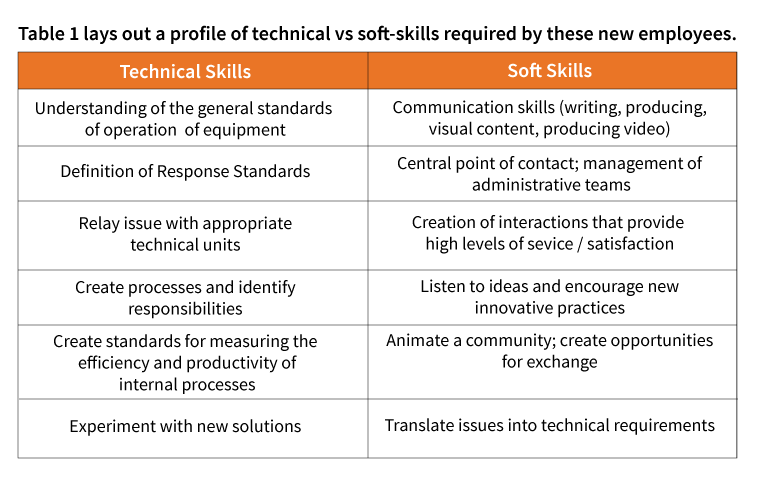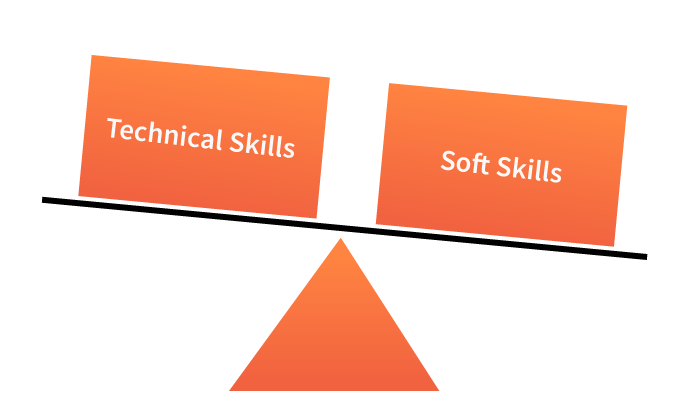Happy, comfortable and productive employees and the new generation of office managers making it happen
By Fernanda Arreola and Gregory Unruh
New demands are emerging in the service sector that require people-oriented managers who also understand the technical aspects of operating large facilities. Our research shows a need for new “transversal” professionals capable of merging hard technical abilities with soft relational ones. A prime example is a new generation of Hospitality Managers that fulfill the hospitality needs of employees in ways that facilitate organisational happiness and engagement.
Capturing the Organisational Value of Hospitality Service Offerings
Executives are increasingly aware of the value that attending to the humanistic needs of an office can bring to the organisation. Research shows, for instance, that providing the basic elements of ergonomy, such as good lighting, workplace ventilation and green spaces, can result in greater work satisfaction with an eventual positive impact on workplace performance.1,2,3 Other companies are employing perquisites and assistance services to attract talented employees and encourage deeper engagement.4,5 Facebook or Alphabet (Google), for example, have rendered their facilities into “campuses” with spaces meant to generate collaboration and informal exchanges while reducing stress levels. The companies further facilitate many of the personal life activities of employees, such as dry cleaning, child care or even making dinner reservations or arranging for flower delivery.6 The goal of these services is to free employees of mundane concerns so that they can attend more fully to their professional work.
[ms-protect-content id=”9932″]
While the value of these services may be more obvious to a generation of younger firms, the reality is that gaining control over the management of an office space, understanding employee needs, creating new spaces for innovation and assuring performance, is not an easy task. This has led some employers to rely on outside service firms as specialist providers.7 Companies normally externalise service-activities that are considered to be outside of the “productive” scope of actions. With this logic, a large number of firms have chosen to abdicate control over an activity that until recently was not considered a performance tool; the management of the workplace. However, when companies outsource an internal service there is a loss of information about the status of the company’s workforce. The firm is no longer aware of the problems their employees regularly face and thus have limited information about the value that such service provides. Furthermore, the possibilities for internal discovery and innovation are lost when control is ceded to an outside provider.
To address this concern, a growing number of companies are establishing a new function to regain links with the elements that increase performance and agility within an office that generally goes by the title of Hospitality Manager.
What is Hospitality Management?
Hospitality management is most often associated with the food, lodging and vacation sectors, industries focused on “hosting” and providing “hospitable” services to leisure clientele. How is the concept of translating to companies and their workforces? To find out we engaged in a 12-month research effort to study the workplace service industry in France. We interviewed the key strategic actors responsible for employee hospitality services including those with the title of Facility Manager, Hospitality Manager and Concierge services, as well as directors of work-environment and human resources. Our interviewing gathered the viewpoints of traditional players, larger firms and new entrants that are finding a demand logic for such services.
While our interviewing did not indicate that there was a universal definition for what a hospitality manager is, there was a recognition to the unique skill set they require. Importantly, successful hospitality managers are capable of balancing and employing both hard technical skills that attend to the objective management of the business and soft relational skills that address the humanistic needs of company employees. As a key account manager facilitating HM services explained, “We are seeing more than anytime before, the need to know our employees, those that work directly with firms providing or facilitating services. We recognise we need to be capable of assessing and measuring their level of expertise on a technical and also on a relational level”.
One interviewee defined this suite of skills for Hospitality Manages as a combination of “know-how” and a “know-how-to-be”. By “know-how” she meant the ability to accomplish the technical aspects of the business and by “know-how-to-be” she indicated knowing how to engage effectively with employees in a way that engages the managers emotional and social intelligence.
The “know-how” task expected of some Hospitality Managers can be very technical, especially when there is an operational facilities management (FM) focus to the company. Furthermore, facility managers must take into consideration not only the services provided within an office space, but also how the design of a workspace impacts employees and their performance and satisfaction at work. As one interviewee, an owner of an architectural firm specialised in office spaces stated “Our activity is the building brick for the management of a facility, is the key for generating services. This is because, when we conceive spaces, we create a distribution of movement, a logic of work”.
While perspectives are diverse, a preponderance of managers highlighted that hospitality management requires someone who can establish a community and become very visible to the organisation. They need to be able to produce a transversality that allows communication between people (and what they need) and teams of service providers (and what they are able to propose). As one interviewee told us, in a site with over 1,000 employees and more than 10,000 visitors, it is impossible for people to know who to go to when something is not working. Having a centralised person that can facilitate the interactions of the entire community was so important to the interviewed HMs that they acknowledged the need to create ambassador programs with “referents” that can help them transmit and gather information.
For many companies, the hospitality managers responsibilities are not limited to attending to employees inside the company, Many are expected to consider the needs of customers as well. As one executive from one of the largest Facilities Management providers put it, “We started providing Hospitality Management services because we noticed how difficult it was to make our customers happy. In our sites, in those in which we have an HM, we have a better view and a closer relationship that allows us to be in touch with our technical teams”.
A new generation of Factótums
Ideally a hospitality manager blends in unique skills that make him be a translator of information, a communicator of needs, a problem solver that understands technical standards, and a process-oriented innovator. These skill sets are very hard to find in a market that has a very straight line division between soft and hard skills. So how are Hospitality Managers recruited and trained?
Interviewees noted the difficulty in identifying the empathy and emotional intelligence elements, something that renders the process of filling the available positions very burdensome. One director of FM, argued that there is no obvious answer to this question. In recruiting, she relies on a key interview question to illuminate a candidate’s suitability for a hospitality position. She presents candidates with a stressful situation, sometimes taking it into a roleplay. Beyond the specific answer, she is looking to see that the candidate knows how to listen, can ask clarifying questions, can show empathy and can relate to the problem from an insider’s perspective.
Other executives see the challenge as confronting one of two choices. You can hire on the “know-how” technical employees and train them on the “know how-to-be” relational skills, or you can train emotionally intelligent service employees on the technical aspects of the business. Complicating the challenge is the fact that a recruited employee, has no visibility of the type of site that he will be assigned to. An employee that could perform well on an office-only space, may be ill-prepared for a more technical, industrial site. This is where the leadership skills of the recruiter and manager comes into play.
While the hiring and training criteria for hospitality managers is still evolving, there was general agreement on the measure of their success in the position. The real test of a hospitality manager is the ability to be imperceptible. “If everything goes well,” noted one interviewee, “we do not get called. It is when things go bad that people remember we exist.” And this is also one of the key challenges for this particular field, turning employees proactive as opposed to reactive, and being able to communicate in this regard.
For the VP of a service-provider that recently launched an HM arm stated, “For us it is very important to bring a certain degree of excellence to the services we provide; to guarantee that people will be working in ideal conditions. To anticipate their needs. The challenge is therefore on communication, on rendering the invisibility of the job of a good hospitality manager, visible”.
[/ms-protect-content]
About the Authors
 Fernanda Arreola professor of Strategy, Innovation & Entrepreneurship at ESSCA. Her research interests focus on service innovation, governance, and social entrepreneurship. Fernanda has held numerous managerial posts and possesses a range of international academic and professional experiences.
Fernanda Arreola professor of Strategy, Innovation & Entrepreneurship at ESSCA. Her research interests focus on service innovation, governance, and social entrepreneurship. Fernanda has held numerous managerial posts and possesses a range of international academic and professional experiences.
 Dr. Gregory Unruh is the Arison Professor of Values Leadership at George Mason University in Washington, DC and an expert on sustainable business strategy. He serves as the Sustainability Editor for the MIT Sloan Management Review.
Dr. Gregory Unruh is the Arison Professor of Values Leadership at George Mason University in Washington, DC and an expert on sustainable business strategy. He serves as the Sustainability Editor for the MIT Sloan Management Review.
References
1. De Croon, E., Sluiter, J., Kuijer, P. P., & Frings-Dresen, M. (2005). The effect of office concepts on worker health and performance: a systematic review of the literature. Ergonomics, 48(2), 119-134.
2. Roelofsen, P. (2002). The impact of office environments on employee performance: The design of the workplace as a strategy for productivity enhancement. Journal of facilities Management, 1(3), 247-264.
3. Singh, A., Syal, M., Grady, S. C., & Korkmaz, S. (2010). Effects of green buildings on employee health and productivity. American journal of public health, 100(9), 1665-1668.
4. https://www.forbes.com/pictures/ 56b3b990e4b062f6b5994e 8b/the-top-10-employee-perks/#508d637564c3, retrieved on July 23, 2019
5. https://fortune.com/2016/03/28/these-32-companies-have-concierge-services-for-employees/, retrieved on July 23, 2019
6. https://www.inc.com/business-insider/14 – popular – perks -for-new-parents-that-go-beyond-paid-parental-leave.html, retreived on July 23, 2019
7. http://workplacemagazine.fr/Archives-article/Fiche/6925/De-l%2592accueil-a-l%2592hospitality-management, retreived on July 23, 2019





































